« La plus ça change . . . | Main | The new world »
June 14, 2007
How do we deal with choice?
by Ed Cambron
As one of the bloggers working in the trenches trying to put butts in seats, and keeping them there, I hope I can add something to the dialogue that gets us thinking about actions, especially in the orchestra world.
Reading through the essays, I kept coming back to the issue of choice, and Barry Schwartz's thoughts on the subject in the essay Can There Ever Be Too Many Flowers Blooming? How do we help audiences make choices? What are the unique barriers in the orchestra world? Could we learn something from other institutions which seem to be doing a better job of helping people make choices, or at least rising above the noise of all the choice in the marketplace?
As any good marketer knows, word-of-mouth is your best friend. Technology has only made word-of-mouth even more important, as people can communicate instantly and to many, many people at the same time. The press is no longer local, but global as people pick up and spread whatever someone says. So what is word-of-mouth really doing for us? I'd argue it is helping people make choices. If Barry is right when he says, "The twin phenomena of buying only the culture that you want, or relying on filters to tell you what you should want, is becoming pervasive - a response, I believe, to overwhelming choice in the world of culture," then the viral power of word-of-mouth is the ultimate filter.
What does this mean for orchestras? First of all, we rarely present programs that run long enough to even begin to leverage word-of-mouth as a tool to make a choice. Museums, on the other hand, have had major success in mounting exhibitions which have long runs, creating the opportunity to leverage audiences and their voices. Imagine for a moment what might happen if a major American orchestra took a risk and scheduled the same concert for six months, or repeated a program five times in a year. Could they create an opportunity for audiences to make a choice based on the music, and not just the generic choice of going to the concert hall? Does the fact that we don't allow for this kind of choice explain why a very large percentage of people go to a concert and wait years to return? Are those people viewing the experience in a very generic way?
Posted by ecambron at June 14, 2007 9:20 AM
COMMENTS
Post a comment
Tell A Friend
Resources
Engaging Art: The Next Great Transformation of America's Cultural Life Chapter downloads MP3s Vanessa Bertozzi on audiences and participation Vanessa Bertozzi on involving artists in work Steven Tepper argues the historical context of arts in America
Abstracts
Chapter 4
In & Out of the Dark - (a theory about audience behavior from Sophocles to spoken word)
Chapter 7
Artistic Expression in the age of Participatory Culture (How and Why Young People Create)
Chapter 8
Music, Mavens & Technology
(all chapters in pdf form)
Steven Tepper talks about technology and the future of cultural choice
Lynne Conner on the historical relationship between artist and audience
Lynne Conner on event and meaning and sports
AJ Blogs
AJBlogCentral | rss
culture
Terry Teachout on the arts in New York City
Andrew Taylor on the business of arts & culture
rock culture approximately
Rebuilding Gulf Culture after Katrina
Douglas McLennan's blog
Art from the American Outback
Scott McLemee on books, ideas & trash-culture ephemera
Jan Herman - arts, media & culture with 'tude
dance
Apollinaire Scherr talks about dance
Tobi Tobias on dance et al...
media
Jeff Weinstein's Cultural Mixology
Martha Bayles on Film...
music
Greg Sandow performs a book-in-progress
Howard Mandel's freelance Urban Improvisation
Focus on New Orleans. Jazz and Other Sounds
Exploring Orchestras w/ Henry Fogel
Kyle Gann on music after the fact
Doug Ramsey on Jazz and other matters...
Greg Sandow on the future of Classical Music
Norman Lebrecht on Shifting Sound Worlds
publishing
Jerome Weeks on Books
visual
Public Art, Public Space
John Perreault's art diary
Lee Rosenbaum's Cultural Commentary
Tyler Green's modern & contemporary art blog
Special AJ Blogs
June 14-20, 2007



